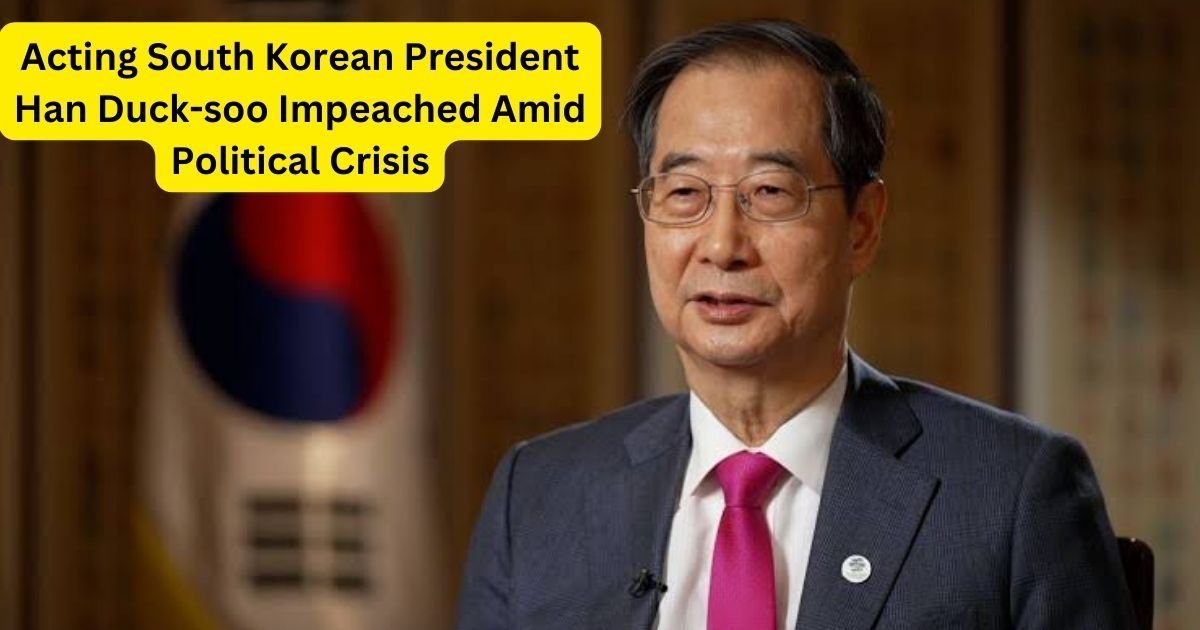By Abdul Jabbar | News Wire
South Korea’s political crisis reached a new high on Friday when the National Assembly voted to impeach Acting President Han Duck-soo, just two weeks after the impeachment of President Yoon Suk-yeol.
A total of 192 lawmakers voted in favor of Han’s impeachment, which surpassed the 151 votes required. It is for the very first time an acting president was impeached in South Korea’s democratic history.
Earlier this month, he became acting president when Yoon was impeached following his controversial plan to declare martial law on 3 December-the parliament overturned his decision within a day.
Turmoil in the Parliament
It was a highly chaotic impeachment vote. Members of the ruling People Power Party (PPP), allied with Yoon and Han, reacted strongly to the declaration by Speaker Woo Won-shik that only a simple majority was needed to impeach Han. This is in contrast to Yoon’s impeachment, which needed 200 votes. With this ruling, opposition lawmakers can now push for the impeachment of Han without any support from the ruling party.
Cries of “invalid!” and “abuse of power!” rang out as PPP legislators condemned the decision of the Speaker. Many members boycotted the vote, criticizing the opposition of using the political crisis to advance their cause of gaining more political power.
Impeachment motion against Han
The impeachment drive was primarily pushed by his insistence on not making a finalization of the Yoon impeachment and his blocking three judicial nominees the parliament selected for the Yoon case. These actions, he said, infringed democratic accountability.
Constitutional Court verdict awaited
The case now goes to the Constitutional Court, which has 180 days to decide on its validity. If confirmed, acting president will be Finance Minister Choi Sang-mok.
The ruling could also influence Yoon’s impeachment process because at least six votes from the nine-member bench are needed to confirm his removal. With only six judges currently seated, a single dissenting vote could keep Yoon in office.
Economic and Political Fallout
Even worse, the political crisis further destabilized South Korea’s economy. On Friday, the Korean won fell to its lowest level against the dollar since the 2008 financial crisis. Both ruling and opposition parties have continuously been blaming each other for the chaos.
In a statement, Han expressed respect for the National Assembly’s decision and pledged to await the Constitutional Court’s ruling. “I will step aside to avoid further contributing to the unrest,” he said.
The turmoil dates back to December 3, when Yoon’s sudden declaration of martial law shocked the nation. Although rescinded within hours, the decision sparked widespread condemnation and legal actions. Key figures in Yoon’s administration have since been arrested, and Yoon himself faces impeachment and multiple legal summons, which he has so far defied.
With the nation caught in an unprecedented political gridlock, South Korea faces an uncertain future as it struggles to navigate its most significant democratic crisis in decades.
Read More News:
Five Gaza Journalists Killed in Israeli Strike on Alleged Armed Group Members
